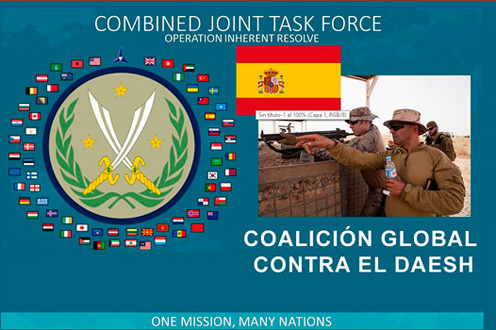At ministerial meeting of Global Coalition against DAESH
"Increase in personnel has not only been well received by Western members of the coalition, but also by Iraq", says María Dolores de Cospedal
News - 2016.12.15
In this regard, María Dolores de Cospedal announced that she will present the proposal to increase this contingent by 125 members as well as the deployment of 25 Guardia Civil officers, following its approval by the Council of Ministers on 9 December, to the Lower House of Parliament on Tuesday, 20 December.
She also highlighted that "this increase may even start to be implemented at the beginning of 2017, in a modular fashion to adapt to the constantly changing circumstances in the region, with initial deployment to the base in Besmayah.
The Minister for Defence positively assessed the results of the meeting and highlighted that the recent successes achieved in military operations are comparable with the progress made in other areas, such as cyberspace, strategic communication and financing, since all of these have considerably impaired the capabilities of DAESH.
María Dolores de Cospedal also underlined that the position advocated by Spain has been to contribute to achieving a stable situation in Iraq, since "DAESH is not only an enemy of Western countries but also of those Muslim countries that do not share its fundamentalist approach".
The minister also expressed her gratitude to the State law enforcement agencies, which have managed to arrest more than 150 Jihadists within our borders and have collaborated in arresting a further 30 within the framework of foreign operations, thus reducing the capabilities of DAESH to threaten coalition countries.
On the sidelines of the ministerial meeting, María Dolores de Cospedal held a bilateral meeting with her British counterpart, Michael Fallon, to step up cooperation and continue working together on those issues where interests converge.
The meeting also served to formally bid farewell to the current US Secretary for Defence, Ashton Carter, whom the Minister for Defence thanked for his leadership and on a task well done over these last few years.
At the working meetings, the defence ministers analysed the developments in the military campaign against DAESH and the measures adopted to alleviate the humanitarian crisis in those areas liberated from terrorist occupation, debated the trans-regional threat and tackled the main guidelines of the coalition's plan for next year.
This fourth ministerial meeting included the presence of the defence ministers and high representatives of the 15 main countries that contribute forces to the coalition: Germany, Australia, Belgium, Canada, Denmark, Spain, the United States, France, Iraq, Italy, Norway, New Zealand, the Netherlands, the United Kingdom and Turkey.
The next ministerial meeting of the Global Coalition against DAESH is scheduled to take place in Denmark next March.
Spanish contribution to coalition
The present contribution by the Spanish Armed Forces to the Global Coalition against DAESH amounts to 307 personnel, of which the main part of the contingent are deployed at the training centre in Besmayah, which is headed up by Spain. Spanish servicemen are also training the Iraqi special ops forces in the cities of Baghdad and Taji.
In the event that the proposal to increase the military presence is approved, the contingent will go from the 300 members that are currently deployed in Iraq to 425, in order to improve the training capabilities in priority areas for stabilisation, such as the fight against improvised explosive devices (IEDs), logistics and healthcare.
In turn, the deployment of 25 Guardia Civil officers would contribute to the training of the Iraqi police forces so that the Iraqi security forces will be able to carry out the duties of armed forces in their own right.





